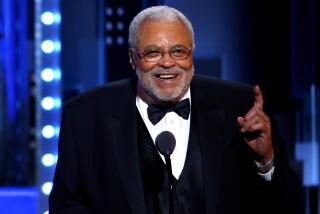Indomitable Kirk Douglas was ‘the ragman’s son’ till the very end
- Share via
Before there was Kirk Douglas there was Issur Danielovitch, a boy born in 1916 to illiterate Russian Jewish immigrant parents. And before young Issur there was his father, Herschel Danielovitch, a man of truly formidable strength of will.
As Douglas related in his exceptional autobiography, “The Ragman’s Son,” his father had a particular way of quitting smoking. “He would carry a cigarette in his shirt pocket and every time he felt like smoking, he would pull out the cigarette and confront it: ‘Who stronger? You? Me?’ Always, the answer was the same: ‘I stronger.’ Back the cigarette would go, until the next craving. It worked for him, and it worked for me.”
Whenever I think of Kirk Douglas, who died Wednesday at the age of 103, I think of that story. Not of his trio of Oscar nominations, not of his classic roles as the ambitious boxer in “Champion,” the anguished Vincent Van Gogh in “Lust for Life,” the articulate slave in “Spartacus.” I think of that puny cigarette.
For the argument could be made that the heart of Douglas’ imposing acting career was his ability to project his father’s — and his own — brand of unstoppable willpower and drive onto a variety of characters. When you add anger — “There was an awful lot of rage churning around inside me,” he wrote of his boyhood, “rage that I was afraid to reveal” — you have the makings of a singular star persona that no one ever mistook for anyone else.
Though his first role was 1946’s “The Strange Love of Martha Ivers” (a part he got with the help of acting school pal Lauren Bacall) and his first significant film 1949’s “A Letter to Three Wives,” written and directed by Joseph L. Mankiewicz, Douglas came into his own when he became the driven, self-centered boxer Midge Kelly in 1949’s “Champion.”
Douglas’ decision to avoid a body double and do his own boxing led him to develop a ring style suitable for the part: “always moving forward, no matter how many times I got hit. Even when I got smashed in the face, I kept moving in. I was relentless.”
That description not only fits how Midge Kelly fought, it describes the kinds of characters best embodied by Douglas: the Bix Beiderbecke-inspired trumpeter in “Young Man With a Horn,” the ambitious reporter in “Ace in the Hole” or the inevitably ruthless Hollywood producer in “The Bad and the Beautiful.”
Never a fan of the Hollywood studio system, Douglas rose up as a maverick filmmaker
In person, if his autobiography is any judge, Douglas could act the same way. When he was in Paris in 1952 filming “Act of Love,” for instance, the actor found himself shooting on the Pont Alexandre Trois. “Then I found out that Alexandre Trois was Czar Alexander III, who ruled Russia from 1881 to 1894 — the height of the pogroms, and the reason my parents had to leave Russia. He was a world-class anti-Semite, right up there with Hitler. I spit on his bridge.”
While Douglas’ characters could rarely be called introspective, his roles gradually inclined toward people with more nuanced drives. Among the best of those was his tortured Vincent Van Gogh opposite Anthony Quinn’s Paul Gauguin in Vincente Minnelli’s “Lust for Life.” Here, as in the title role of “Ulysses,” the Italian-made version of the Odyssey, when Douglas threw himself into a role he owned it for life.
Though he ended up losing the best actor Oscar that year to Yul Brynner in “The King and I,” Douglas was never one to brood. His next significant role came in one of his best films, the stunning antiwar drama “Paths of Glory,” written and directed by the then little-known Stanley Kubrick, a film that would not have gotten made without Douglas’ star power backing it.
Kirk Douglas has died at age 103. His son Michael, Steven Spielberg, Rob Reiner and William Shatner are among Hollywood royalty sharing their tributes.
Branching out increasingly into production, Douglas’ behind-the-scenes influence was considerable in one of his biggest commercial successes, the slaves-in-revolt drama “Spartacus.” Losing confidence in director Anthony Mann, for instance, he brought Kubrick in to direct this as well.
More significantly, his insistence on having Dalton Trumbo recognized as the film’s screenwriter was critical in the demise of the Hollywood blacklist. “Thanks, Kirk,” Trumbo told Douglas, “for giving me back my name,” and when the actor won a special Oscar in 1996, it was for being “a creative and moral force in the motion picture community.”
If Douglas had a favorite among his roles, it was likely 1962’s excellent “Lonely Are the Brave,” a film little seen when it came out (or now for that matter). Playing a traditional cowboy whose values were at variance with the modern world, Douglas relished being a character who stood up for what he believed, no matter the cost.
Even after a stroke in 1996 affected his ability to speak, Douglas could not bear to stop working. In 2010, at age 93, he even did a one-man show, “Before I Forget,” in the theater named for him in Culver City. When you fight your way out of the ghetto, someone once said, you’re never sure you’re out, and Kirk Douglas, even with all his accomplishments, never gave up the fight.
More to Read
Only good movies
Get the Indie Focus newsletter, Mark Olsen's weekly guide to the world of cinema.
You may occasionally receive promotional content from the Los Angeles Times.











